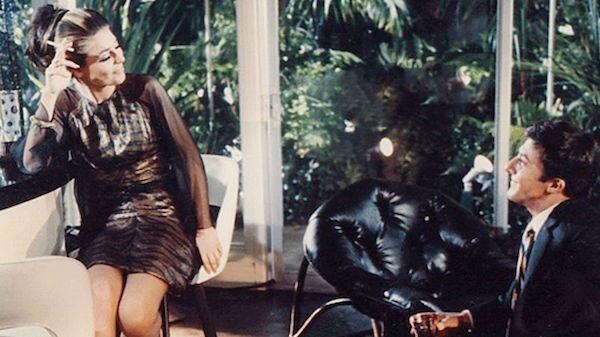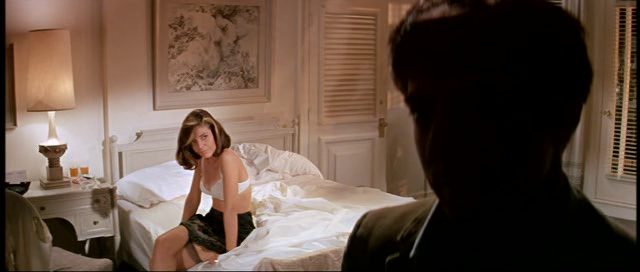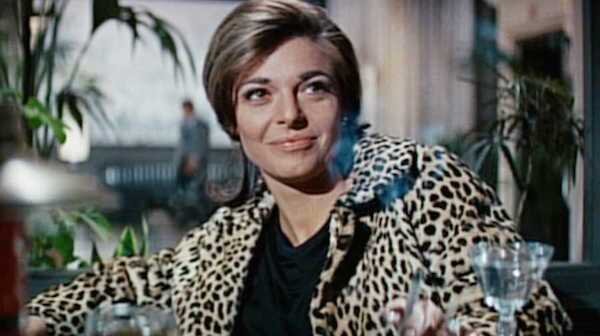It’s been 20 years since the world was first introduced to Naomi Wolf’s seminal feminist text The Beauty Myth. Anna Francis looks at how such theories and fears apply to The Graduate’s enigmatic older woman, Mrs Robinson.
“Recent research consistently shows that inside the majority of the West’s controlled, attractive, successful working women, there is a secret ‘underlife’ poisoning our freedom; infused with notions of beauty, it is a dark vein of self-hatred, physical obsessions, terror of ageing, and dread of lost control.” - Naomi Wolf, The Beauty Myth
Mrs Robinson has often been treated as a character of fun; a seductive older woman, sung of so jauntily in Simon & Garfunkel’s ode to her. She is an early representation of the cougar – long before the uninspiring term was coined – and remains a comical figure to many. The Urban Dictionary describes her name as “a term used to describe an older woman who likes to seduce younger men”, and cites her light-hearted recreation as Stifler’s Mom in American Pie. But to think of Mrs Robinson in such unimaginative terms pays a disservice to her multifaceted character. Her relationships with her lover, husband, daughter, and ultimately her own position in life as an ageing woman, offer an insight into darker aspects of womanhood that, despite The Graduate being over 50 years old, still resonate uncomfortably. She embodies key elements of The Beauty Myth, Naomi Wolf’s seminal feminist manifesto detailing how society uses definitions of beauty to repress women. The myth argues that patriarchal structures determine female value based on attractiveness, with youth particularly prized, thus giving women an overwhelming fear of ageing; fear of being viewed differently after having children, of no longer being seen as attractive; even of developing jealousy towards younger women whose youthfulness is their currency. Mrs Robinson, a middle-aged wife and mother living in 1960s America, reflects these concerns as the audience watches her transform from a character who almost playfully embodies the ideas of sexuality and motherhood - traditionally feminine roles - to one of sadness and envy, driven by fears the beauty myth has forced.
From the beginning of the film, Mrs Robinson appears to be a forgotten woman. Her first appearance on screen could easily be missed, as she sits silently at a party thrown by her husband’s business partner Mr Braddock and his wife to honour their son Ben - an anxious 20-year-old concerned about his future - following his recent graduation. When she first makes contact with Ben, Mrs Robinson intriguingly blends opposing roles that the myth prescribes – sex object and mother – as she offers herself to him in an almost maternal way, speaking as if talking to a child. Yet there is also a sense of longing for validation, something that the myth urges women to pursue, when Mrs Robinson asks Ben what he thinks of her. These contrasting aspects of her character reflect the “false choice” of the myth that Wolf describes; “Which will I be, sexual or serious?”
Perhaps Mrs Robinson’s clumsy attempt at seduction finds its basis in the sexual revolution of the era, when the introduction of the pill allowed women to be sexual “cheerfully, sensually, playfully”, as Wolf discusses, and took away physical and mental elements of pain associated with abortion and childbirth. But as Virginia Nicholson explores in How Was It For You? - a fascinating insight into the realities of life for 1960s women - this movement didn’t necessarily reach everyone. Not only was it predominantly a facet of youth culture, but Nicholson argues that it benefited men most of all. Both Mrs Robinson’s age and gender are against her in accessing this sexual liberation.
As the affair develops, Mrs Robinson remains maternal but cold towards Ben – during their first sexual encounter he appears nervous, leading her to coolly give him instructions. There is little visible passion from her, the fling seemingly being a mere distraction. The myth has driven her to seek validation, as it urges women to always pursue the next thing – incidentally, an often highly marketable and profitable thing – that will supposedly give them self-worth. Yet as the relationship progresses, it becomes clear that this mission has failed. Once gained, the recognition, in this case manifesting as the sexual approval of a man, is never enough. As Wolf says, “Most urgently, women’s identity must be promised upon her ‘beauty’, so that we will remain vulnerable to outside approval, carrying the vital sensitive organ of self-esteem exposed to the air.”
This is evident in the gap in maturity between Mrs Robinson and Ben, when she explains how she married Mr Robinson after falling pregnant, and that they now sleep in separate bedrooms. Ben seems oblivious to her sadness. His failure to comprehend renders Mrs Robinson even more unknowable. When she visits his family’s house as he lounges outside, the sunlight makes all but her outline blind to him.
One of the saddest ploys of the beauty myth is how, in order to set back progress made by the feminist movement and prevent women from collaboratively utilising their power, it instead pits us against one another. Girls are taught to see other women as competition, based on physical and sexual appeal, and this can shatter intergenerational relationships. As Wolf explains, “Rivalry, resentment and hostility provoked by the beauty myth run deep. […] Mothers often have difficulty with their daughters’ blooming.” And so it seems for Mrs Robinson in her feelings towards her daughter, Elaine. She orders Ben not to date Elaine, and at this point appears to be trying to protect her from her own fate: a loveless marriage, and life of boredom. Yet as Ben defies Mrs Robinson’s wishes – and his affection for Elaine grows – Mrs Robinson’s true myth-driven intention becomes apparent. She develops into a pantomimic villain character, as she attempts to sabotage the relationship. There is a sadness and empathy in this; Mrs Robinson has been filled with fear-induced jealousy over her daughter’s youth, freedom and beauty. “Ageing in women is ‘unbeautiful’ since women grow more powerful with time, and since the links between generations of women must always be newly broken. Older women fear young ones, young women fear old, and the beauty myth truncates for all the female life span,” Wolf writes.
But what of Mr Robinson? After the affair has been exposed, he appears more concerned with his wounded pride than the ending of his marriage, embodying the disregard felt by many men of a certain age for ageing women. His business pursuits and wealth will keep his ego afloat; meanwhile Mrs Robinson, thanks to the myth, is lost without her beauty. “The beauty myth is not about women at all,” Wolf argues. “It is about men’s institutions and institutional power.”
It is in the famous final scenes of The Graduate that Mrs Robinson’s myth-borne fears come to a head. Elaine is forced to drop out of college and prepares to wed medical student and old friend Carl; a path akin to her mother’s is ready for her. But Ben has other ideas, and bursts through the doors of the church before the pair attempt to run away together. “It’s too late,” Mrs Robinson shouts, to which Elaine replies, “Not for me!” Mrs Robinson furiously slaps her daughter, but she has lost and the myth has won. Her envy over her daughter’s beauty has destroyed their relationship, whilst she has gained nothing from her affair or dying marriage. Now she will be forced to pursue another form of validation, whether it be in the form of a new lover, a cosmetic treatment or a material item – and so the myth continues.
Can Elaine avoid her mother’s fate? In the film’s unforgettable ending, she and Ben joyfully escape on a bus before their expressions become uncertain, as the camera lingers. Perhaps the myth has already struck Elaine; she has her youth and freedom now, but what next? Will a relationship with Ben provide her with the validation she will unconsciously be seeking, or has she already realised that gaining what she thought she wanted isn’t enough? She is probably facing the same confusion over her position in life that her mother still feels.
The beauty myth affects Mrs Robinson and Elaine’s character development as well as their narrative. Elaine, despite having the myth’s goals of youth and beauty, is a character who we know little about beyond her rather brief conversations with Ben, and who always remains secondary to Ben in their love story. As for Mrs Robinson, we never even learn her first name. She is trapped in her designated roles as an older woman, of wife and mother. Her decision to pursue an affair with Ben and her subsequent desperate sabotage of his relationship with Elaine result from the fears that womanhood can hold; the dread of becoming invisible, and of being replaced. The myth seemingly took hold during the film’s casting process too – Anne Bancroft was just 35 when she became Mrs Robinson, an older character who arguably could have been played by a more mature actress. Hollywood’s treatment of women over 30 seemingly left something to be desired during the middle of the 20th century.
Awareness of the beauty myth’s tricks and falsehoods has increased since Wolf’s book was published in 1990, yet the myth is evidently still hurting many women. Cosmetic brands continually bombard consumers with claims that their ‘anti-ageing’ products will restore youth. Older women dating younger men are still seen as unusual and worthy of mockery. The voices fighting against the myth are getting louder, serving as a reminder that youthfulness, sexual attractiveness and beauty are never the magic solution we crave.
But this didn’t come soon enough to save Mrs Robinson. The life that she could have had is glimpsed early on in The Graduate, when Mr Robinson encourages Ben to “sow a few wild oats, take things as they come, have a good time with the girls” – little knowing that his wife has just offered herself to the disillusioned graduate for the first time, in her daughter’s bedroom upstairs. When Mrs Robinson enters the room, having gotten dressed back into her respectable attire after stripping naked to proposition Ben, her husband, without saying her name or even giving her a cursory glance, explains: “I was just telling Ben here that he ought to sow a few wild oats, have a good time while he can. You think that’s sound advice?” Mrs Robinson – a woman whose own ability to ‘sow her oats’ was taken away when she fell pregnant by Mr Robinson, who has since led an unfulfilling life as his wife, and mother to his daughter, and who is now about to embark on a destructive path driven by the fears she has developed from her loss of youth and her current position in life – simply replies: “Yes, I do.”
Anna Francis is a freelance writer (Instagram @thisisannalisa) with a background in women’s lifestyle. She has an interest in 1960s culture, and takes a lot of pictures of her cats.






